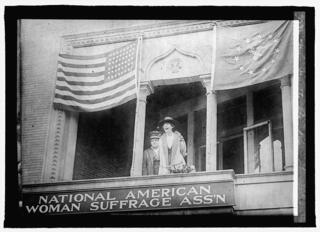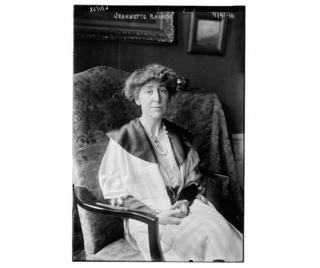Western Women: Bulwarks of a Living Democracy
The women of the West have a special type of resilience. The western expansion of pioneering settlers led generations of women to be raised under a contradiction. We value the opportunities provided by the natural resources of these bountiful lands at the same time that we fight for survival in a frequently harsh and unpredictable physical environment filled with gender, racial, religious and class inequities. Adaptation, gumption and community have become indispensable for excelling within the demands of existence in this environment.
Thriving in this environment results in an awareness of one's own capability, which often shatters society’s traditional gender expectations. Enfranchised out of necessity, western women continue to use their voices and actions to meet the problems of their generation, and hold the door open for the next. The most effective women understand that their voices matter in our democratic society, and to impart change they have the grace to find common ground and understanding with those who think differently.
At SERA, we are fortunate to be a 100% employee owned company with a culture that seeks diverse voices. This value system has led to a working environment where a majority of SERA’s employees identify as female in an industry where women are alarmingly underrepresented. Our firm’s structure reminds us to listen to each other and respectfully ask questions to understand each other's experiences and priorities when we have discourse that encompasses the firm’s gender spectrum.
SERA’s own Beth Lavelle provides a great example in her recent Portland Business Journal article in response to the 2023 Held v. Montana and ongoing Juliana v. United States legal cases. Filed by teenage women plaintiffs from Montana and Oregon, these cases are the first US climate litigations to directly tie climate change to constitutional rights. In her article, Beth advocates for improved building industry regulations to meet the legal liability to maintain a healthy environment posed by these cases. The protection of our environmental resources is just one of the many causes the women of SERA have advocated for with their voices and actions.
As we look back on Women’s History Month, it’s important to remember that a little over 100 years ago, the voices of Held, Juliana, Beth Lavelle, and a majority of SERA–myself included–would not have had the right to vote in our democracy. The trails we blaze today are built on the courage and perseverance of our past mentors, and the lessons they teach can help us clear the way to progress for future women.
Jeannette Rankin: A Trailblazer for Women's Rights and Social Justice
As a young girl growing up in Montana, I listened to my mom’s adoration for Jeannette Rankin, America’s first US Congresswoman, who introduced legislation that would eventually become the 19th Amendment. Jeannette grew up on her Missoula Montana family’s ranch, where she gained confidence in her capability through fixing machinery and completing building projects when she wasn’t looking after her five younger siblings. As a young adult, she was shocked by the living conditions of the low-income and immigrant families she saw while visiting large cities. Determined to improve lives, she became a social worker for women and children in Washington and Montana but was quickly dismayed by the limited impact she felt was feasible within a broken system. She was convinced women’s maternalism could reform public welfare, health, and labor laws if they were allowed to partake in democracy.
Jeannette became a dynamic and tireless worker for the suffrage movement across the country. Stylish and a great orator, she could disarm her audience by meeting them with pragmatism and humor, but she never strayed from her convictions. Her sister Edna once wrote to her, “The thing that impresses people the most is that you are so constructive in your thinking, and yet you don’t seem to want to pound home your ideas with a sledgehammer. You keep it light – even though what you say is dead serious.”
Jeanette utilized the power of grassroots organization when she led Montana’s suffrage campaign in 1914. She pushed women to participate in every precinct in the state and asked them to leverage their networks to advocate for women. It worked, and Montana became the tenth state to give women the right to vote.

Advocacy, Courage, and Political Resilience on a National Scale
Fresh off success at the state level, in 1916, Jeannette ran for the United States Congress to promote her progressive agenda for national suffrage, women’s and children’s welfare, and pacifism as WWI brutalities occurred abroad. She capitalized on the support of her grassroots organization and fellow newly enfranchised women to beat out seven men in her Republican primary and, at the age of 36, became the first woman ever elected to Congress–holding federal office before many women across the country could even vote.
Her moral conviction was tested on her first vote by President Wilson's request for Congress to declare war on Germany. She knew a pacifist vote would hurt her and the suffrage movement politically by making women appear “weak” in the face of war, but she never regretted her “no” vote, later saying, “I still believe war is a stupid and futile way of attempting to settle international difficulties. I believe war can be avoided and will be avoided when the people, the men and women in America, as well as in Germany, have the controlling voice in their government.” Jeannette received much criticism for her anti-war vote, but she did not diminish herself or retaliate against those who belittled her. Her resilient nature taught her to seek out opportunities to show respect and use her charming wit and capable reasoning to find common ground with her political opposition. In return, she secured votes to bring women’s voices into American democracy.
In 1918, she introduced a suffrage resolution to Congress and spoke eloquently about the importance of equal representation.
“Deep down in the hearts of the American people is a living faith in democracy. Sometimes it is not expressed in the most effective way. Sometimes it seems almost forgotten. But when the test comes we find it still there, groping and aspiring, and helping men and women to understand each other and their common need. It is our national religion, and it prompts in us the desire for that measure of justice which is based on equal opportunity, equal protection, equal freedom for all. In our hearts we know that this desire can be realized only when those who submit to authority have a voice in their own government, whether that government be political, industrial, or social.”

Her speech kicked off a debate on suffrage in which Congressman Richard Wilson Austin of Tennessee argued, “The highest, best, and strongest evidence that woman’s suffrage is a success has been established in this House by the enviable record made by our colleague from Montana, who has won the respect, confidence, and admiration of the members and officials of this House.” The resolution passed the House with the required two-thirds majority to become the first national suffrage victory in the 70 years of the movement. It then fell just two votes short of a two-thirds majority in the Senate. However, the suffrage momentum she helped nurture passed the resolution in the Senate a year after her House term expired. It was ratified by two-thirds of the states in 1920 to become the 19th amendment, enshrining American women’s constitutional right to vote.
Jeanette would live a vibrant life full of advocacy for women, children and pacifism, but when asked about her accomplishments, she requested, “If I am remembered for no other act, I want to be remembered as the only woman who ever voted to give women the right to vote.” We thank you and remember you, Jeanette, and the tools of integrity, civility, humor and grace that you showed can break glass ceilings. We will keep our voices active in the living democracy we continue to steward today.



